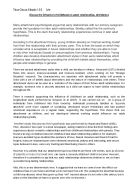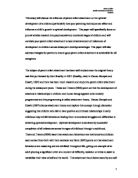A02
Despite the criticism there has been some good evidence for this theory. The relationship between early attachment style and later relationships was demonstrated by Fraley (1998). . He conducted a Meta analysis of studies and found correlations between 0.1 and 0.5 between early attachment types and later relationships. He suggested that low correlations are due to the unstable attachment type that is insecure-anxious. There are however, concerns that an individuals attachment type is determined by the current relationship, and that is why happily married couples are securely attached.
There are issues with gender differences with the interaction with peers. Studies found that girls tend to have more intimate friendships than boys, and are more likely to report care and security. It was also found that girls are more likely to play by sharing, in contrast to boys who tend to play competitive sport games. However, people have claimed that sex differences in this area have been over emphasised and similarities are too often overlooked.
More evidence comes from a longitudinal study, over 25 years long. 78 participants were studied at four key points; infancy, early childhood, adolescent, and adulthood. The finding did support the claim that expression of emotions in adult relationships can be related back to a persons earlier attachment experiences.
However, there are issues with restricted samples with many of these studies. In most cases the samples are highly restricted, usually using a small number of adolescents from one school or town in the U.S. These samples therefore do not represent the experience of adolescent experiences, and it is difficult to generalise these highly culturally specific experiences to other cultures.
AO1
There is evidence that attachment processes also shape adolescent relationships. Formal operational thinking allows them to be able to view current parental relationships with hypothetical ideals, which may lead to the conclusion that they do not suffice, or that other relationships do meet their needs better. Adolescents attachment usually shifts from parents to peers, and it is usually when most experience there first romantic relationships These help in two ways, they allow them to shift their focus from parents to peers, and allow them to gain a new type of physical intimacy that is quite different from that experienced with parents.
A02
There has been evidence to suggest that autonomy is most healthy when accompanied by continuing warm and close relationships with parents. A study on 10-18 year old found that whilst time spent with ‘family sharply decreased, time spent with each parent individually remained constant, suggesting adolescent relationships supplement, not replace parent child ones.
Although research suggests adolescent relationships can be healthy for later ones, there are possible negative effects. For example it was found that romantic involvement sometimes increased some forms of deviance, and other evidence to suggest that it was associated with decreased academic achievement. However, it should be noted that these effects were not found in late adolescent relationships suggesting the timing is also important.
One last criticism of this theory is that it can suggest determinism: very early experiences have a fixed effect on later experiences, and so children are doomed to experience emotionally unsatisfactory relationships at one year of age. This has been proved wrong, many cases have been found when insecurely attached infants have experienced happy adult relationships.
To conclude, the evidence is enough to say that early childhood, through to adolescent experiences do tend to have an effect of adult relationships, but are not necessarily determining.









